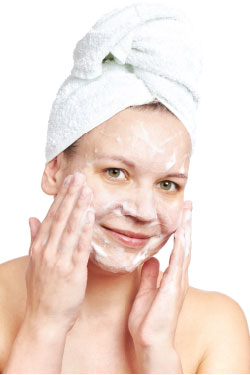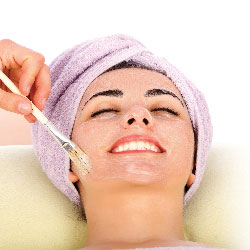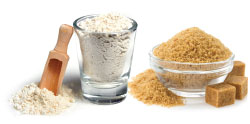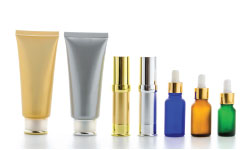It is not surprising that the skin acts up in winter, as clients mostly get stuck indoors with dry, stale air, and are out of the sun’s healing rays. When clients do venture out, it is hunched over into freezing temperatures that dry the skin. Furthermore, they deal with added seasonal stress and the increased risk of illness. During the winter, clients often change their diets to include more comfort food and adjust their routine in response shortened, gray days. All of these factors can throw the skin and mood into a full-on funk, or a skin crisis. With this self-consciousness and sense of helplessness, how can clients feel their best?
Although the first thought may be to slather on moisturizer to combat dryness, exfoliation is the first real step to keeping the skin fresh, new, clear, and dewy during winter months. It is the first step toward attaining and sustaining healthy, glowing skin. It is truly amazing how much skin can be exfoliated during the winter!
CAUSES OF WINTER SKIN PROBLEMS
 Many seemingly reliable sources state that skin in crisis should not be exfoliated. Whether dealing with acne or eczema, skin care professionals are told to avoid disturbing the skin as much as possible to keep from triggering a flare-up or making one worse. Unfortunately, this well-meaning advice could not be further from the truth.
Many seemingly reliable sources state that skin in crisis should not be exfoliated. Whether dealing with acne or eczema, skin care professionals are told to avoid disturbing the skin as much as possible to keep from triggering a flare-up or making one worse. Unfortunately, this well-meaning advice could not be further from the truth.
During the winter or a skin crisis, exposure to distinct environmental and lifestyle factors can cause skin to throw inflammation and bacterial production into overdrive. Spending more time indoors exposes clients to all sorts of toxins and illnesses that they would normally avoid. All of this exposure can weaken the body’s resiliency toward them. This is where a more modern approach to the science of skin care is absolutely crucial. Many skin care lines are antiquated – separating products as normal, oily, and anti-aging. Skin care should be moving forward with all the other sciences and the technology of ingredients being developed every day, educating the public that skin types are long done. It is about treating the whole body, not just what is happening on top, and doing so with well-formulated skin care products that go beneath the surface with actives that penetrate in stabilized delivery systems. These products should not irritate the skin and can be used in a high concentration to actually do something in the long- and short-term.
Hormonal factors, oil imbalances, underlying systemic imbalances, allergies, and any immunity issues are important factors to consider when formulating skin care products and when choosing products for clients. What is the product going to do?
HOW EXFOLIATION WORKS

All of these factors can make dealing with winter skin seem futile. Skin gets dull from cell buildup, dry because moisture cannot penetrate it, and potentially red from inflammation. By removing that layer of cell buildup through exfoliation (when the skin is dry, not red and weeping), clients are free to focus on, nourish, and protect (through proper moisture) the fresh skin underneath.
Proper exfoliation does not just consist of scrubbing with a washcloth (which can actually pull at skin, making it worse), but using a formulated exfoliant with gentle ingredients, such as colloidal oat. Soft ingredients like sugar, rather than hard-edged salt, that can be customized to the sensitivity of the skin removes dead, dry, and damaged skin buildup from clients’ faces and bodies fully and gently. It triggers the body to repair areas that are going through crisis and signals the body to spend more resources on balancing the area, something that is often neglected in the winter. For example, skin that is too oily will calm down once the excess layer of buildup is removed, while skin that is too dry will ramp up oil production.
It is not just the skin on the face that benefits from a good exfoliating treatment either. Skin is the first layer of protection against the outside world. It is the largest organ and keeps the body healthy. By creating a great whole-body exfoliation routine, the skin is kept at its best.
Chemical peels are applied over a series of visits to gradually remove long-term buildup and restore the skin’s balance. Prepare clients for this treatment and make sure they understand that just one peel might make them feel better in the short term, but they will miss out on long-term benefits.
THE RIGHT EXFOLIATION
As mentioned before, going to town with scrubbing the skin is not going to cut it. Exfoliation is much more than just the mechanical removal of buildup, especially with the right ingredients. When done properly, it can be a complete life-changer for skin in crisis. Proper exfoliation requires the right ingredients and the right methods.
There are a lot of choices when it comes to exfoliation, but not all of these choices are beneficial; some methods can even leave the skin worse than it was before.
First, it is important to understand that not all chemicals are a bad thing; there are both synthetic chemicals and organic chemicals. Synthetic chemicals are laboratory created and often harsh and overly drying. Natural or organic chemicals are found in nature (photosynthesis is a natural chemical occurrence) and when those high-end, laboratory-refined actives from 100 percent pure botanicals are properly formulated and used on skin, they provide far better clinicals than synthetics.
Synthetic Microbeads versus Organic Apricot Pits
Both synthetic microbeads and organic apricot pits have physical inclusions that scrub away cell buildup. The former, a synthetic, poses a real danger to wildlife and ecosystems – so much so that microbeads are banned in several states. The latter is organic and widely available, but can create microscopic tears in the skin’s surface, adding to inflammation and creating an opportunity for harmful bacteria to enter the skin. While they are natural, apricot pits are too harsh for the skin and can cause scarring and spotting. For skin conditions like eczema and acne, this ingredient worsens a crisis. It is almost like scratching at the face with fingernails, something that should never be done.
 Sanding Sugar
Sanding Sugar
So what is the right exfoliant for winter skin problems? The best solution is a clean, pure exfoliant that uses something customizable, soft, meltable, and something without hard edges. Sanding sugar is an excellent choice with rice powder being great as a soft accompaniment. Sanding sugar is a customizable, hexagonal sugar crystal that softens and reduces in size while being used, but is strong enough to actually remove skin buildup. Sanding sugar provides deep, granular exfoliation and alpha hydroxy acid cell renewal. It does all of this without tearing or inflaming skin, posing a threat to the environment, or causing the irritating and inflammatory side effects of volatile synthetic additives. Because it addresses the buildup on the skin and penetrates beyond the skin for a truly deep cleaning, sanding sugar can be a beneficial choice for all
skin types.
Peels and Acids
Peels are another choice for non-manual exfoliation. In this case, look for the use of pure fruit enzymes. Enzymes gently dissolve buildup and penetrate through the skin to deliver a healthy glow through
deep cleaning.
Additionally, pure glycolic acid, lactic acid, and the like are also options for exfoliation that can benefit clients. Like the alpha hydroxy acids found in sanding sugar and pure fruit enzymes, pure glycolic acid offers the benefit of a natural chemical exfoliant that gets rid of cell buildup and penetrates deeply.
By using organic or pure exfoliants, clients can avoid the nasty side effects of volatile synthetic actives and provide a deep cleansing that is totally pure, stable, and safe.
PROTOCOL FOR TREATMENT IN THE OFFICE AND SPA
 The skin care professional is the keeper of knowledge and the coach that is helping clients return to having natural, healthy, and radiant skin. In order to best assess the client’s needs, professionals should start with a consultation.
The skin care professional is the keeper of knowledge and the coach that is helping clients return to having natural, healthy, and radiant skin. In order to best assess the client’s needs, professionals should start with a consultation.
Clients should be asked about any skin conditions they have, whether their skin crisis is new or recurring, and about any changes in routine they have experienced lately. Be sure to note any medications that could cause an adverse reaction during treatment (for example, some medications can make people more sensitive to chemical peels.) Different skin conditions require different considerations. For example, professionals would not treat acneic skin in the same way as they would treat dry skin, although the basic premise of care is the same.
Clients should be questioned about their skin acidity as well. If they can drink orange juice and coffee without a problem, they probably have a fairly acidic body and would be fine with a chemical peel. If not, a patch test should be performed to determine sensitivity.
Winter skin is cured with diligence, not overnight, and can be kept in check with a good exfoliant and a daily, follow-up moisturizer. The best way to approach the exfoliation process is through long-term treatment, one that begins in the spa with the application of an exfoliant scrub or cleanser. Work the cleanser into the client’s skin gently and let it sit for the appropriate amount of time before rinsing with cool,
clean water.
Chemical peels are applied over a series of visits to gradually remove long-term buildup and restore the skin’s balance. Prepare clients for this treatment and make sure they understand that just one peel might make them feel better in the short term, but they will miss out on long-term benefits.
Remember, exfoliation does not just benefit the face, so it should be stressed to the client that a whole-body exfoliant routine is the best way to go. Nobody would clean just the parts of their house that could be seen. The same principle applies with exfoliating the skin on the body. Given how much and how easily miniscule ingredients are absorbed into the body through the skin, the ingredients used all over are even more important to overall health. Just because the world does not always see the skin on the body, does not mean it does not deserve the same treatment and attention that the face receives. Stress to the client the link between healthy bodily skin and overall health.
Skin gets dull from cell buildup, dry because moisture cannot penetrate it, and potentially red from inflammation
IMPLEMENTING SUCCESSFUL EDUCATION AND HOMECARE
Clients need to take care of their skin when the professional is not around. This means that skin care professionals will have to educate clients on proper homecare. Remind clients that they need to exfoliate and moisturize to treat their skin right.
It is also helpful to discuss lifestyle tips for keeping skin healthy. Winter skin, especially, needs more hydration, so encourage clients to drink more water than they think they will need. It is easy to forget to drink water when temperatures are cool. If the client exercises a lot, drinking the proper amount of water to get their electrolytes in balance is the best thing a client can do for their overall skin appearance, health, and energy levels.
Do not forget to mention that other drinks are not a substitute for fresh water, especially around the holidays when it is super tempting to indulge in sugary hot chocolate, a little alcoholic treat, or even coffee and tea for an extra energy boost. Besides being dehydrating in nature, sugary drinks can wreak havoc on the skin’s ability to regenerate. They are a no-go for healthy skin.
Recommend a product line that uses pure, but highly proactive, ingredients tailored to the client’s skin issues, challenges, and goals. Be honest with clients about application frequency and just how much of a change they can expect, especially over time and with repeated use. It is possible to have clear, radiant skin with long-term effects and without damaging side effects, but only with proper products, diligent care and application, and without the constant interference of synthetics.
 Skin issues occur so often and result in ongoing, underlying systemic issues like inflammation, oil imbalances, and bacteria production. Wintertime exacerbates these issues, causing an imbalance in already-compromised immune systems; allergies faced by cold and dry climates do not help.
Skin issues occur so often and result in ongoing, underlying systemic issues like inflammation, oil imbalances, and bacteria production. Wintertime exacerbates these issues, causing an imbalance in already-compromised immune systems; allergies faced by cold and dry climates do not help.
Understanding, and helping clients to understand, that weekly, even daily, exfoliation with clinically-
proven, pure organic ingredients, which stabilize sensitivities and penetrate beyond the surface of the skin, is an invaluable and necessary part of skin care. Diligent homecare treatment, proper lifestyle changes, and regular spa visits are also important. Remember, if the skin is not healthy, the body is not healthy.
Clients often put up with “as good as it gets” for their skin and not just during the winter. However, it does not have to be that way. A skin crisis or an ongoing skin condition is not just how the skin is, it is something that can be fixed.
Healthy exfoliation is a minimal time investment into our overall bodily health; supporting that with the right skin care routine for the client’s particular needs and goals can make their skin shine from the inside out without synthetics that cause long- and short-term damage. It is possible and it is easier to achieve than ever before.
 Suki Kramer, founder, formulator and president of suki® skincare, is a progressive, independent natural skin care pioneer committed to challenging beauty industry assumptions, advocating for women’s health, education, and empowerment, and delivering strong, safe solutions for all skin problems and sensitivities. Today, Kramer is a recognized industry advocate with a mission to pass on her self-confidence and knowledge to all who are suffering from skin problems or feeling helpless to the industry. By using her love of writing as a platform for her advocacy, Kramer helps others become as informed as possible about ingredients, label reading, and how to question suppliers and authority. Her resume includes published work with The Huffington Post, her own blog, sukiscoop, HAPPI, DERMASCOPE, and many health and
Suki Kramer, founder, formulator and president of suki® skincare, is a progressive, independent natural skin care pioneer committed to challenging beauty industry assumptions, advocating for women’s health, education, and empowerment, and delivering strong, safe solutions for all skin problems and sensitivities. Today, Kramer is a recognized industry advocate with a mission to pass on her self-confidence and knowledge to all who are suffering from skin problems or feeling helpless to the industry. By using her love of writing as a platform for her advocacy, Kramer helps others become as informed as possible about ingredients, label reading, and how to question suppliers and authority. Her resume includes published work with The Huffington Post, her own blog, sukiscoop, HAPPI, DERMASCOPE, and many health and
industry magazines.
Want to read more?
Subscribe to one of our monthly plans to continue reading this article.